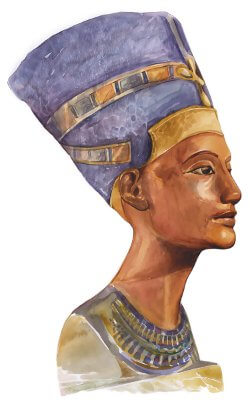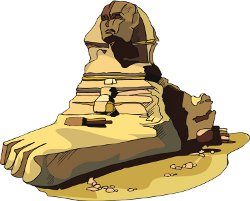English Reading Practice
Egypt
Egypt is a country in North Africa. Most of Egypt is desert. The longest river in the world, the Nile, runs through Egypt providing areas of very lush green. "Lush" means full and healthy.
Egypt is often thought of as one of the longest inhabited countries in the world. "Inhabited" means that people live there.

People have lived in Egypt for 8000 years, since 6000 BC. For much of this time, Egypt was the most powerful country in the world. It had the strongest government of any civilization at the time. A "civilization" is a group of people who live together and have the same culture.
The Nile river is thought to be the most important element (part) of why the ancient Egyptian civilization was so successful. Thanks to the richness of the soil and the available water, Egyptians were able to have abundant supplies of food and animals. "Abundant" means a lot of something.
The ancient Egyptians were very influential and had a big impact on how the world developed. Many of the things that were created or built in ancient Egypt are still standing or used today. For example, the ancient Egyptians created systems of math, writing, and medicine that influenced the systems we use today.
The fact that we still use these systems or can see ancient Egyptian monuments (important historical buildings) shows not only how well-built many of these places were, but also how they are still seen as important today.
The Pyramids of Ancient Egypt
The ancient Egyptians created many impressive buildings. What is perhaps most impressive is that they built these structures (buildings) without the help of the machines we have today.Some of the most famous structures the ancient Egyptians built were the pyramids.

The pyramids are triangle-shaped buildings that are out in the desert. They were used as tombs (burial places) for ancient Egyptian Pharaohs and their families. "Pharaoh" is the name of the ruler of ancient Egypt, like a king or an emperor.
So far, archeologists, historians who study ancient cultures, have found over 100 pyramids in Egypt. They are still exploring so are likely to find more.
Outside many of the pyramids, the ancient Egyptians built large statues called Sphinx. These statues are of mythical (imaginary) creatures. The creatures have the head of a man or bird and the body, legs, and tail of a lion. They were built in front of the pyramids as guards for the tombs of the Pharaohs.

The pyramids were built on the west bank of the Nile. Many were built near the Egyptian city of Giza. The pyramids of Giza are some of the largest structures ever built.
Anthropologists (people that study the human race) believe that it took 20,000 to 30,000 people to build each pyramid. They also think that it took over 20 years to build some of the structures.
Inside the pyramids, archeologists have found many beautiful items such as jewelry, statues, furniture, and writing that have helped them learn more about the ancient Egyptian cultures.
And now, practice:
Egypt - Exercises
Vocabulary Questions
1. What does “lush” mean?a) full and healthy
b) empty and healthy
c) empty and sick
d) full and sick
b) empty and healthy
c) empty and sick
d) full and sick
2. What does "civilization" mean?
a) a group of animals that
are similar
b) a group of people that are similar
c) a group of buildings that are similar
d) a group of foods that are similar
b) a group of people that are similar
c) a group of buildings that are similar
d) a group of foods that are similar
3. What does "structures" mean?
a) people
b) animals
a) writings
b) buildings
b) animals
a) writings
b) buildings
Grammar Questions
1. Egypt was _______ most powerful country in the world. a) a
b) the
c) an
d) that
b) the
c) an
d) that
2. The ancient Egyptians _______ very influential and had a big impact on how the world developed.
a) are
b) were
c) have been
d) will be
b) were
c) have been
d) will be
3. The Sphinx were built _______ the pyramids as guards for the tombs of the Pharaohs.
a) in front of
b) at
c) on
d) under
b) at
c) on
d) under
Comprehension Questions
1. What are some systems that the Egyptians created that we still use
today?_______________________________________________________________
2. What were the pyramids used for?
_______________________________________________________________
3. What did archeologists find in the pyramids?
_______________________________________________________________
Get Updates, Special Offers, and English Resources
Download your FREE GIFT (the first two chapters of
English Short Stories Book and Workbook)
as soon as you join!

By submitting your email, you consent to receiving updates and newsletters from us and to the sharing of your personal data with third parties for the purposes of sending you communications. We will not spam you. You can unsubscribe at any time. For more information, please see our privacy policy.




